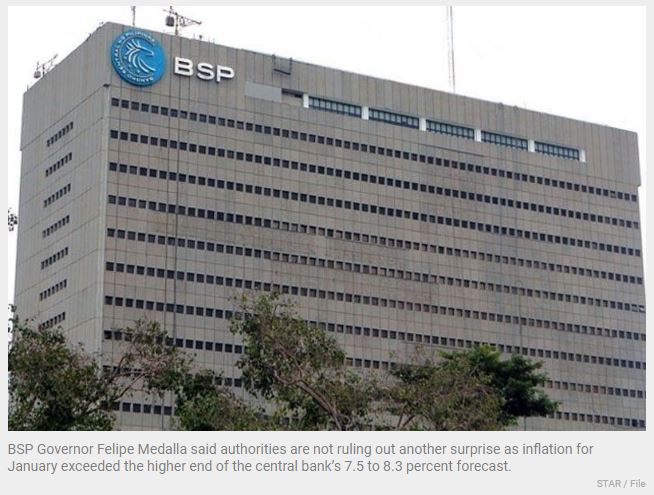Philippines: BSP not ruling out another supply shock
MANILA, Philippines — The Bangko Sentral ng Pilipinas (BSP) is not ruling out another surprise supply shock after inflation blew past expectations to hit a fresh 14-year high of 8.7 percent in January from 8.1 percent in December.
BSP Governor Felipe Medalla said authorities are not ruling out another surprise as inflation for January exceeded the higher end of the central bank’s 7.5 to 8.3 percent forecast.
Medalla, who earlier said inflation already peaked in December last year, said the fresh 14-year high in January was likely the peak for the consumer price index (CPI).
“Most likely. Of course, I can’t rule out another surprise,” Medalla said in a Viber message to reporters.
Inflation accelerated to 5.8 percent last year, exceeding the BSP’s two to four percent target range, from 3.9 percent in 2021. It quickened to 8.1 percent in December from eight percent in November.
Based on its last assessment, the central bank sees inflation easing to 4.5 percent this year, still above the central bank’s target range, and further to 2.8 percent next year.
To tame inflation and stabilize the peso that slumped to an all-time low of 59 to $1 last October, the BSP raised key policy rates by 350 basis points.
This brought the benchmark interest rate to a 14-year high of 5.50 percent last year from an all-time low of two percent.
With the surprise inflation outturn last month, economists are expecting a higher rate hike during the first rate-setting meeting of the Monetary Board scheduled on Feb. 16.
Former finance undersecretary Romeo Bernardo, country analyst for the Philippines at New York-based GlobalSource Partners, said the current momentum would likely see the headline inflation rate continue to trek up and bring the average for this year to around seven percent.
The think tank originally projected inflation to ease to 4.8 percent this year from last year’s 5.8 percent.
It said that a minimum 25-basis-point increase in policy rates is on the table for the BSP rate-setting meeting on Feb. 16, with January inflation surprising on the upside and raising inflation expectations.
“Despite the extension of reduced tariff rates for key commodities (swine meat, corn, rice and coal) under Executive Order 10, the latest inflation print points to the need for other urgent measures to address supply shortfalls and bring down prices of food items,” Bernardo said.
Bank of the Philippine Islands lead economist Jun Neri said inflation may go up to 6.6 percent in a worst-case scenario if supply problems are not addressed instead of a baseline scenario where inflation could ease to 4.8 percent.
Neri said inflation could stay above 8.5 percent in February following the unexpected surge in January.
“A lower inflation print is more likely in March or April if oil prices remain stable. Inflationary pressures from food may also start to subside in these months as the harvest season begins and as imports arrive. Additional relief is expected due to the recent appreciation of the peso,” Neri said.
The lead economist of the Ayala-led bank said the latest inflation figure provides a strong argument for additional rate hikes to help in easing price pressures coming from revenge spending
Japan’s Nomura has raised its inflation forecast for the Philippines this year to 5.6 percent from 4.4 percent as strong inflation momentum unexpectedly came back.
Nomura’s Euben Paracuelles and Rangga Cipta said that headline inflation rose significantly well above expectations last month.
“The pickup in January was broad-based but a few key items stood out,” Paracuelles and Cipta said.
Food inflation, Nomura said, rose to 10.7 percent from 10.2 percent rather than easing slightly, while other vegetables price inflation surged to 80.8 percent from 51.2 percent, reflecting the impact of surging onion prices due to reported supply shortage.
Nomura expects a back-to-back 25-basis-point rate hikes in February and March.
Source: https://www.philstar.com/business/2023/02/09/2243537/bsp-not-ruling-out-another-supply-shock


 Thailand
Thailand




